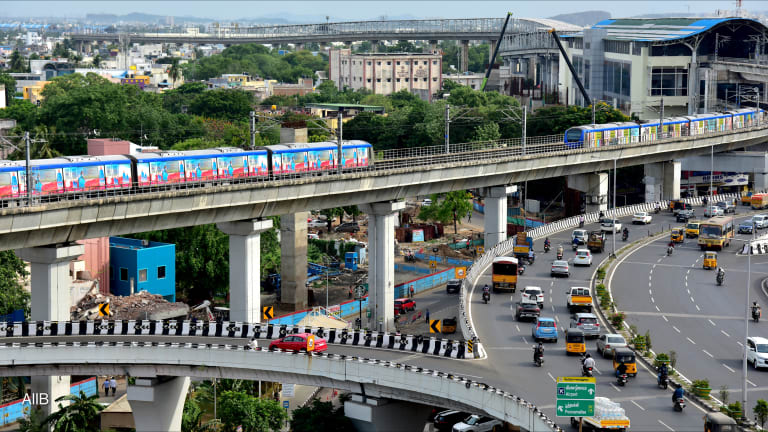Debunking myths around the displacement-climate change connection

SAINT PAUL, Minn. — Misconceptions about the link between climate change and displacement can hamper humanitarian assistance efforts and protection of people affected by disasters, the head of the Internal Displacement Monitoring Centre said Tuesday.
IDMC director Alexandra Bilak said her organization has become increasingly concerned about misperceptions around the climate change-displacement narrative, which she said is fueled by “sensationalist” media reports.
Focus on: People and the Planet
This series explores how climate change and other planetary imbalances impact the rising trend of human inequality. We look into the potential solutions to eliminate inequality and support a healthy planet.
“Increasingly, the different factors driving slow onset environmental as well as social change become difficult to disentangle one from another,” Bilak said during a virtual event Tuesday. “The interaction of social, political, environmental, and economic factors means that climate change must be understood as just one factor in a complex system that generates and perpetuates displacement risk.”
Too often, she said, the press takes data and figures from studies and reports out of context, oversimplifying what such numbers mean. The domination of these false narratives creates misinformation about the true causes of the challenge, she said, and therefore undermines dialogue about solutions that can be pursued by policymakers.
“I’m always uncomfortable when I see climate activists making the claim that climate change will displace zillions of people who will become climate refugees, because that claim is just not based in science.”
— François Gemenne, director of the Hugo Observatory, lead author of the Intergovernmental Panel on Climate ChangeThere is also too often a perception that displacement caused by disasters are easier to resolve than displacement caused by conflict.
“The assumption that most people can return, can rebuild their home, and can recover soon after a disaster has struck means that some displaced people may drop off the radar and they will then miss out on some critically important assistance that is needed not just in the immediate aftermath of a disaster but also very much over the longer term,” Bilak said.
There were more than 50.8 million people internally displaced around the world at the end of 2019, according to IDMC. There were nearly 25 million new displacements from disasters, while there were 8.5 million caused by conflict. Afghanistan, India, and Ethiopia had the largest total numbers of people internally displaced by disasters at the end of 2019, while Syria, Colombia, and the Democratic Republic of Congo had the largest total numbers internally displaced by conflict and violence.
IDMC has tracked disaster displacement for 12 years, and Bilak said its evidence shows that displacement is generally not short-lived — but can be avoided.
People tend to think of disasters as “inevitable,” she said, which gives the impression that displacement is natural and acceptable. This keeps the focus on preparedness and humanitarian assistance, Bilak said, rather than addressing structural, longer-term disaster risk reduction and sustainable development.
This is particularly true when it comes to the myth of mass displacement caused by climate change to Europe or other Western countries, Bilak said. Centering the narrative on impact felt by wealthy receiving countries that have shown a tendency to close down their borders prevents any conversation about solutions and long-term resilience building. It also ignores the fact that the vast majority of people affected by climate or environmental events end up internally displaced rather than in another country.
François Gemenne, director of the Hugo Observatory and lead author of the Intergovernmental Panel on Climate Change, said the narrative of “zillions” of people knocking on the door of Europe is “highly problematic.”
“As lead author of the IPCC I’m always uncomfortable when I see climate activists making the claim that climate change will displace zillions of people who will become climate refugees, because that claim is just not based in science,” Gemenne said. “Most of the estimates that circulate in the press or on social networks are not based on robust estimates or robust models.”
Although people may have good intentions, the narrative can be used to encourage governments to act against climate change as a deterrent to migration, not as the end goal itself, Gemenne said. Advocating for a reduction in emissions can instead lead to more border controls and restrictive migration policies, using people on the move as scapegoats for problems beyond their control that lead to displacement, he said.
Trying to disentangle migration caused by climate change from other causes of displacement ignores the complexity of the entire phenomenon, Gemenne said. For example, environmental factors cannot easily be separated from economic ones.
“The amount of money we are going to have in our bank accounts at the end of the month does not depend on the weather,” Gemenne said of the members of the virtual event panel. “But for most people on the planet, there is a direct linkage between the environmental conditions and their economic resources. And I think that we need to recognize that and that what we would label as an environmental problem is also for most people an economic problem.”
Climate change is just one facet of the global ecosystemic crises being faced by the globe, said António Vitorino, director general of the International Organization for Migration.
“We will, however, not be able to understand, let alone address, the different impacts of this environmental crisis unless we account for all its components and causes whether related to climate change or more broadly to the environment,” Vitorino said.
“We must also remember that this environmental crisis is a social crisis. It is poverty, inequality and marginalization that determine people's vulnerability.”
This focus area, supported by the U.N. Development Programme, explores how climate change and other planetary imbalances impact the rising trend of human inequality and vice versa. Visit the Focus on: People and the Planet page for more.

Search for articles
Most Read
- 1
- 2
- 3
- 4
- 5








